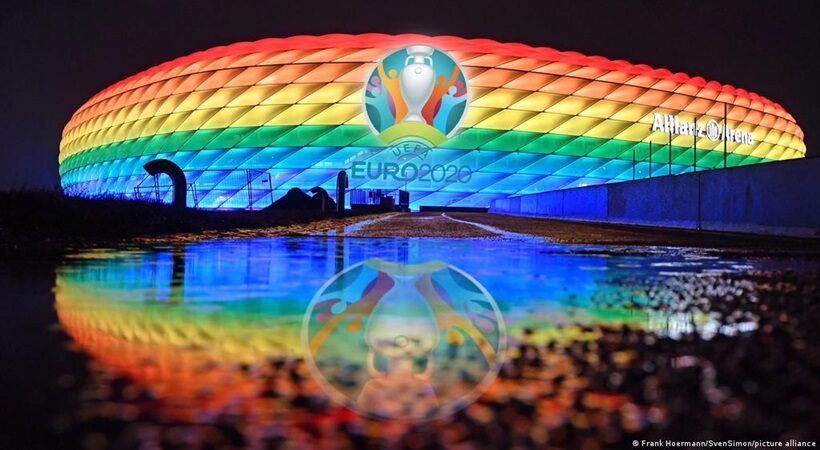“Sports and politics are two distinct entities and they should not be mixed at all.” This is what the majority of people say when a burning issue gets highlighted during a sporting event. However, despite the efforts to keep the two things separate these have become an inseparable ally. This aspect came to the fore recently during the UEFA Euro 2000 tournament. The German team wanted to light up the Munich Stadium in ‘rainbow colours’ for the Euro 2020 match against Hungary. However, the European football governing body, UEFA, turned down the request due to its political nature.

Image Credit: Alexandra Beier/Getty Images
UEFA stated that they have shot down the rainbow lighting proposal in order to maintain a neutral stance with regard to political matters. “Some people have interpreted UEFA’s decision to turn down the city of Munich’s request to illuminate the Munich stadium in rainbow colours for a EURO 2020 match as ‘political’. On the contrary, the request itself was political, linked to the Hungarian football team, presence in the stadium for this evening’s match with Germany,” UEFA said in a statement. The request for the rainbow colour from Germany was meant to show solidarity with the LGBT community in Hungary after the former passed a new law prohibiting access of any content to minors portraying homosexuality or sex reassignment, which was denounced as homophobic by several human rights groups.
Read More: Tokyo Olympics 2020: India Object Unfair Rules For Covid-Hit Nations
This is not the first time politics and sports have got mixed and won’t be the last time also. Earlier, as well, South African cricket team was barred from international cricket for 22 years due to the Apartheid politics in the country. In 1980, the United States started a revolution by boycotting the Summer Olympic Games in Moscow to retaliate against the late 1979 Soviet invasion of Afghanistan. In total, 65 nations refused to participate in the game. During the 1968 Mexico City Olympics, two American track and field stars raised fists on the podium to direct their anger towards US race relations and the Vietnam War. In fact, this protest is considered as one of the most unconcealed political statements in the history of the modern Olympics. So, what happened at UEFA tournament was not an exception as the world of sports is replete with such incidents.

Image Credit: Quora
These episodes have prompted many to call for separating sports from politics. However, is it possible? India, for example, has cut sporting ties with Pakistan over the issue of cross-border terrorism for several years. This has been criticized by several international players, not only from Pakistan, for unnecessarily mixing the game of cricket with politics. However, those who call for detaching sports from politics do not understand how intertwined both are. Disregarding the same is akin to demeaning the game, its participants and the issues in question. Hence, the time is ripe to end the argument of “simply play the game” just because some people don’t exactly understand the issues being raised and the emotions involved in the same. Let us follow the maxim “ to each his own” in such matters.



















